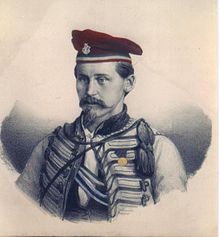August Wittich
August Wittich (born August 7, 1826 in Königsberg (Prussia) ; † March 25, 1897 there ) was an archivist and librarian in Königsberg i. Pr.
Life
Wittich attended the Kneiphöfsche Gymnasium and studied theology at the Albertus University in Königsberg . Without taking an exam, he became a tutor for a while . Finally, in 1875, he found a permanent position as head of the Königsberg City Library and the Königsberg City Archives , where he stayed until his death. When the dilapidated Stoa Kantiana was demolished in 1880 and Kant's bones were excavated, Wittich took part in the work. In 1892 he discovered the old prison in the Albertinum .
In the winter semester of 1848/49 he became a member of the Silver Litthuania . With Otto von Oehlschläger he founded the Corps Baltia on May 11, 1851 . He was an excellent senior and for decades the spiritus rector of the Corps, which he wanted to get out of the shadow of the Corps Masovia throughout his life . When he was needed by Silber-Litthuania in the winter semester of 1852/53, Baltia made him the (third) honorary corps boy . He went into the corps studenthood , for which he neglected his professional training. He fought resolutely for the preservation of East Prussian idiosyncrasies in the Königsberg Corps. With the founding of the empire thus in a lost position, he laid down the Baltenband in 1873. Of his own free will, he put it back on at the 40th Foundation Festival (1891). When "August" (as he was called by his first name, contrary to corps student custom) died at the age of 72, every Balte who could be reached took part in the last honor of the deceased, despite the semester break. After the funeral, the corps brothers gathered in the corps pub in his spirit and sang from Hoh'n Olymp in memory of him , while the funeral salamander completed the official part.
“As he represented his two corps in the SC at the time, he now worked for his hometown, whose tradition he had to preserve, while at the same time the treasures of the past had to be brought to light for the present so that they could serve research. It was not his job to intervene in political developments and direct the fate of his fellow citizens, as he had understood his position as a senior at the time. His profession filled him, however, because, as the choice of his studies showed, he saw primarily an educator and not a leader as his life's work. Despite the restless youth, he tended to be contemplative. But he was difficult to deal with when it came to fundamental questions in his view. "
literature
- Siegfried Schindelmeiser: The Albertina and its students 1544 to WS 1850/51 and the history of the Corps Baltia II zu Königsberg i. Pr. (1970-1985). For the first time complete, illustrated and annotated new edition in two volumes with an appendix, two registers and a foreword by Franz-Friedrich Prinz von Preussen, ed. by Rüdiger Döhler and Georg von Klitzing, Munich 2010. ISBN 978-3-00-028704-6 .
Remarks
- ↑ Below the picture is the dedication: “Regiomonti d. July 15, 1854. Chap. 1 Timoth. C. 5, v. 23: “Don't drink only water anymore, but because of your stomach and your frequent sickness, enjoy some wine.” DS To use as you like, daily and nightly. An old recipe from a primal theologian, but despite its age unsurpassed for all time, a mockery and ridicule for all medical professionals! August Wittich born August 7, 1826, archivist and city librarian in Königsberg, Silber-Litthauer and founder of the Corps Baltia, active May 15, 1851 - November 30, 1852 see. lb. Ernst Dalkowski, b. March 30, 1832, Dr. med. and general practitioner in Wiesbaden., founder of the Corps Baltia, active May 17, 1851 - 1853, zf E. "
- ↑ In the commemorative publication for Masovia's 50th foundation festival, it says on p. 40: “The secretary of the secret archive, Mr. August Wittich, a dear friend of many Masurians, had put on a festive dress for the Carzer of the old Albertinum” and a large sign for Masovia ( blue-white-red), three small ones for Borussia (white-black-white), Baltia I (blue-white-blue) and Scotia (blue-black-blue) and three for Littuania (green-white-red), Normannia (light blue-gold-black) and Baltia II (white-light blue-black-white) appropriate - “as the colors of the old Königsberg country teams, whose members once found leisure up there to think about the complaints of studying, the fencing floor and the pub . "
Individual evidence
- ↑ Kösener corps lists 1910, 139/22; 137/1.
| personal data | |
|---|---|
| SURNAME | Wittich, August |
| BRIEF DESCRIPTION | German archivist and librarian |
| DATE OF BIRTH | August 7, 1826 |
| PLACE OF BIRTH | Königsberg (Prussia) |
| DATE OF DEATH | March 25, 1897 |
| Place of death | Königsberg (Prussia) |

